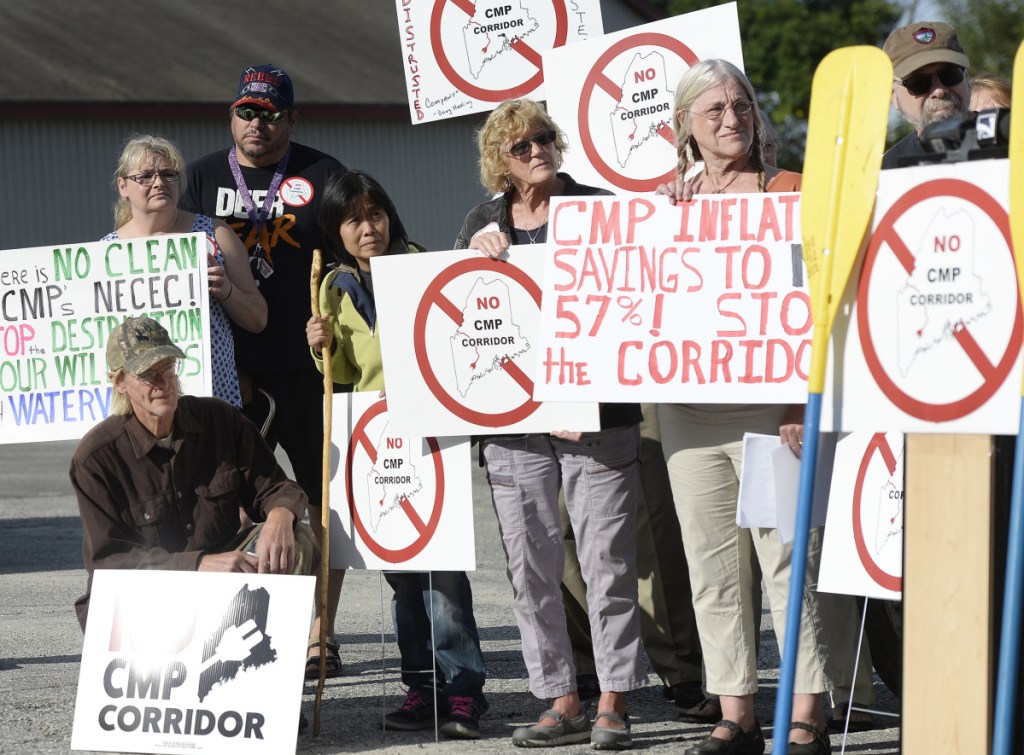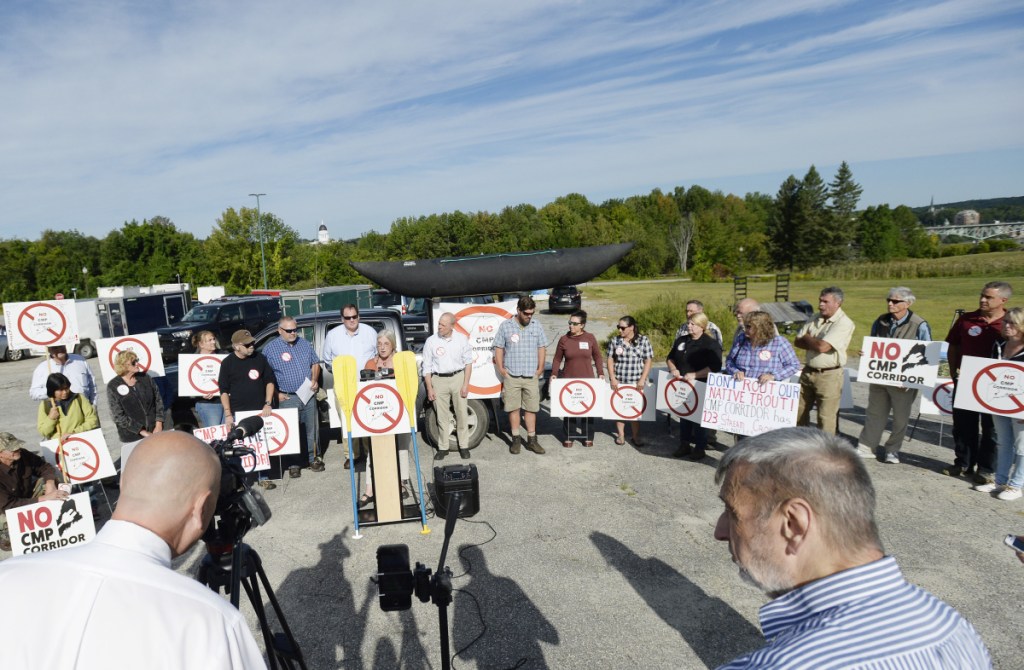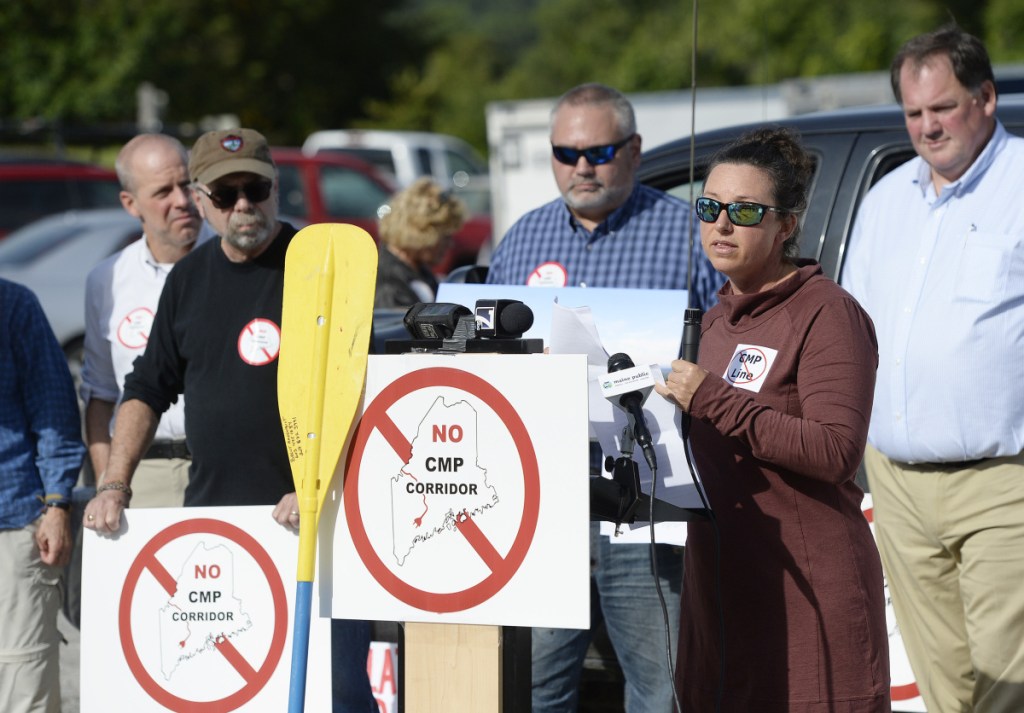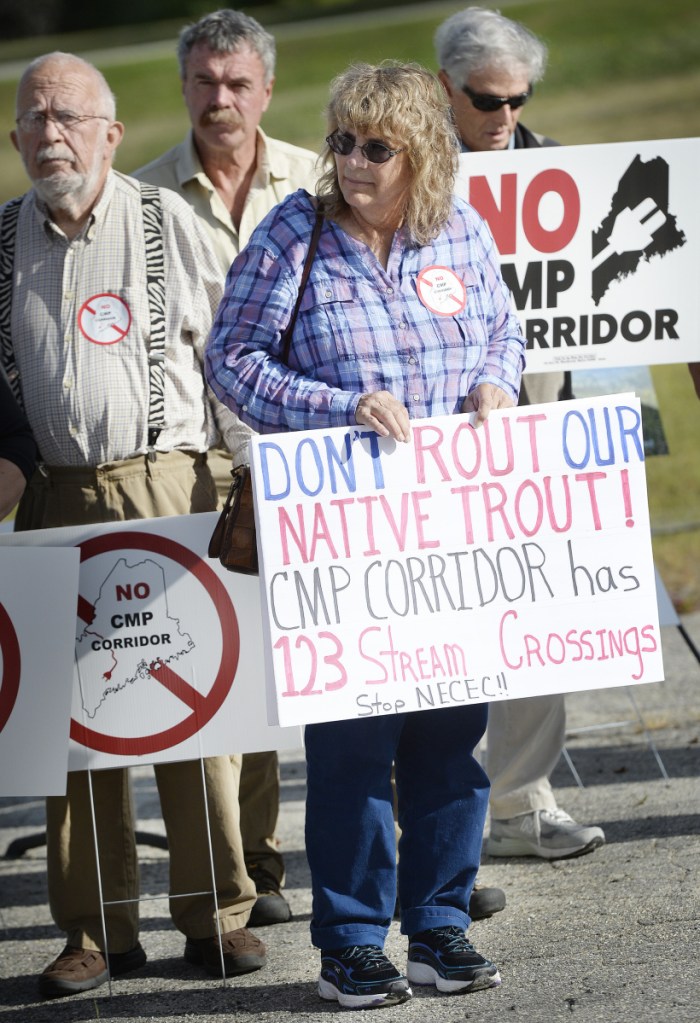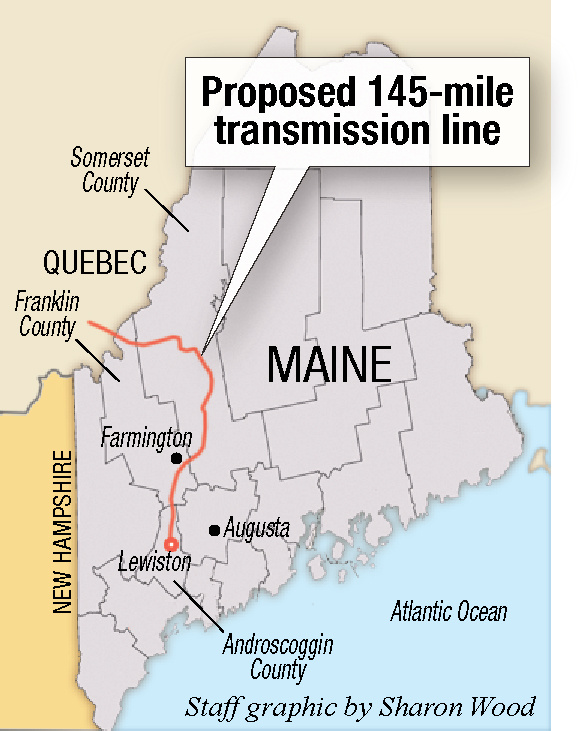AUGUSTA — As a registered whitewater rafting guide in Somerset County, Kimberly Lyman has heard from visitors to Maine about their desire to experience the wilderness and spend time away from developed places.
So the prospect of a 145-mile transmission line running from Quebec to Lewiston and on to Massachusetts, including a crossing at the Kennebec Gorge, has her concerned.
“This power line and the doors it will open to more development and expansion of other methods of generating energy that Maine does not even need will undoubtedly have negative effects on outdoor recreation and our guiding businesses,” Lyman said.
On Friday, she was one of about 30 people who gathered at the Maine Department of Environmental Protection to protest Central Maine Power Co.’s proposed New England Clean Energy Connect project, many of them holding signs, kayak paddles, hiking sticks or fishing lines.
Speakers at the rally touched on a variety of concerns about the project — the effect on the environment, tourism and wildlife; what benefit there is for Maine residents and ratepayers; and whether the power line would threaten the development of renewable energy in the state.
It came as officials from the DEP and Land Use Planning Commission, which will be hosting public hearings on the project this fall, met Friday to discuss logistics for the hearings and the permitting process.
John Carroll, a CMP spokesman, said Friday the company has confidence in the project and believes it will benefit Maine through cleaner air, economic development, jobs and property tax benefits for Maine communities.
When it comes to environmental concerns, Carroll said, state and federal regulations are designed to protect natural resources, and CMP believes it has developed a project that is in keeping with those regulations.
“The state’s rules and regulations and federal rules and regulations regarding environmental permitting recognize the value of all those resources,” Carroll said. “They take into account how it should be done properly and to the extent there’s an impact, they provide for how you should compensate or mitigate.”
Criticism of the project Friday also referenced recent controversy surrounding CMP’s response to an October windstorm that left 470,000 customers without power and a class-action lawsuit that complains about unusually high electricity bills.
“CMP’s job in Maine is to deliver and bill electricity in Maine,” said Judy Hopkins, a representative of the CMP Ratepayers Unite Facebook page formed in the wake of the storm. “It’s their only job, and yet they can’t do it right. If they can’t do that right, why would we possibly think they could care for a dangerous 145-mile-long power line through our pristine Maine woods?”
The Maine Public Utilities Commission staff recently concluded CMP’s response to the storm was “reasonable,” and Carroll said Friday that for people to continue to argue it was mishandled is misleading and inaccurate.
Meanwhile, Hopkins, like others, also talked about the power line’s effect on the wilderness and said she has safety concerns related to its high-voltage technology.
“I’m here because the pristine mountains, streams and Maine heritage ponds can’t speak for themselves,” said Kaleb Jacob, a registered Maine guide and president of the Upper Enchanted Road Association in Upper Enchanted Township. “I’m also a business owner and an employer, so I can appreciate closing a large deal, but I draw the line at pushing an initiative amidst so much opposition from people who are most affected by the end result.”
The Natural Resources Council of Maine is among groups opposed to the project. Nick Bennett, a staff scientist for the council, said Friday the project is a “terrible idea.”
“This is going to bisect a piece of unfragmented forest that is the largest temperate boreal forest in the world,” he said. “It’s spectacular. I work for the Natural Resources Council of Maine, but I’m also a hunter and I’ve hunted in that area. The whole project is going to put a gash through the wilderness that makes me extremely angry and extremely sad.”
Jeff Reardon, Maine brook trout project director for Trout Unlimited, said the transmission line would cross some of Maine’s best brook trout habitats.
“It would be hard to find a place to put this corridor where it would put more brook trout resources at risk and hard for CMP to propose doing it in a way with less protection for the resources that will be affected,” Reardon said.
Two state lawmakers — Rep. Janice Cooper, D-Yarmouth, and Rep. Seth Berry, D-Bowdoinham — also spoke Friday and questioned whether Maine is receiving enough benefits from CMP in exchange for hosting the project.
The company has said it expects the project to generate about $18 million in annual property tax payments to Maine communities and also has pledged $22 million in conservation projects and nature-based tourism in Somerset County, though critics have said their mitigation efforts pale in comparison to an alternative project that had been considered in New Hampshire.
Berry, who was among four lawmakers who sent a letter to the Massachusetts Department of Public Utilities in May opposing the project, said the group still has not heard back from Massachusetts on their concerns.
“How much is Maine’s wilderness worth?” Berry said. “I can tell you it’s worth a whole lot more than what CMP proposes to give it. In New Hampshire, the last offer from Eversource before that project was finally rejected was over $500 million in mitigation — money for rural economic development, money to lower the cost of energy to New Hampshire residents. We’ve seen nothing of that sort in our state.”
In addition to approvals from the DEP and the LURC, the project also requires permitting from the PUC, which will be holding two public witness hearings next Friday.
The meetings are scheduled to be held at the University of Maine at Farmington Roberts Learning Center, Room 131 in Farmington; and The Forks Town Hall in The Forks.
Both meetings will be held at 6 p.m., and the public will be able to ask questions and give comments.
Rachel Ohm — 612-2368
Twitter: @rachel_ohm
Send questions/comments to the editors.


